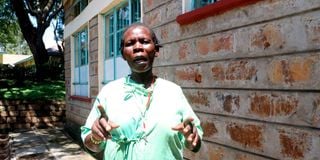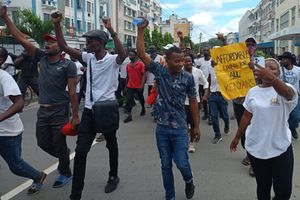Happening now: Liveblog: Kenyan youth stage #OccupyEverywhere protests
Hope for women with fistula as more repair centres on the way

Siprina Achieng prepares to undergo a fistula corrective surgery at Homa Bay County Teaching and Referral Hospital.
What you need to know:
- According to the World Health Organization, every year, between 50,000 to 100,000 women worldwide are affected by obstetric fistula.
- And in Kenya, about 3,000 women develop fistula every year. The ministry also estimates that children die in 90 per cent of pregnancies where a woman develops fistula.
When Magdaline Aoko ,67, stepped out of Homa Bay County Teaching and Referral Hospital on November 1, 2023, the joy written all over her face said it all. For the first time in 20 years, the mother of seven would finally get to interact with her friends without making them uncomfortable, something that had been made impossible by her health condition.
Having lived with obstetric fistula for two decades, Magdaline, a resident of Kanyadoto in Ndhiwa Sub-county, had been deprived of her social life and suffered physical and psychological pain as well as social stigma. Her movements were limited to her compound as the condition would make her pass urine without control.
Trouble started in 2003 when Magdalene visited a local health facility in search of family planning services. Having given birth to 14 children, her family advised that she be placed on birth control. She chose tubal ligation — a permanent form of birth control in which a woman's fallopian tubes are tied or blocked.
But little did she know that the procedure would cost her her social life for the next couple of years. Magdalene notes that she started passing urine without control a few days after leaving the hospital. This was the beginning of a painful 20-year journey.
She bought medicines in different pharmacies while also avoiding taking liquids, but the condition got worse.
“Whenever I stepped out of my house, those around me would hastily disappear or cover their noses and mouths,” says Magdalene. Others would even spit in front of her, something that made her feel like an outcast.
To avoid the stigma, she resorted to spending most of her time indoors.
When she finally gathered courage to visit a health centre, she was diagnosed with obstetric fistula, an abnormal opening between a woman's genital tract and her urinary tract or rectum; causing urinary and faecal incontinence. Doctors explained that the condition arose from a botched tubal ligation procedure that she had underwent earlier on.
The condition, she was told by health workers, could be reversed. However, she could only get the services out of the county due to lack of equipment and qualified personnel in her home county.
She had to endure the stigma until November 2023, when she underwent corrective surgery at Homa Bay County Referral Hospital during a free medical camp.
The surgery was supported by the United Nations Population Fund, Mpesa Foundation, Africa Medical and Research Foundation, Beyond Zero, Flying Doctors Society of Africa and the county government.
More than 50 women benefited from the corrective surgeries.
The women cited lack of equipped facilities and trained health practitioners as the main factor derailing management of the condition. This is even as a number of counties are yet to put up health centres that can offer fistula corrective surgeries.
“I am glad to have received treatment. However, my biggest worry now is where to go for check-up since we do not have health experts in the county who attend to the condition,” she said.
Siprina Achieng, also diagnosed with fistula in 2008, has for the past 15 years been avoiding taking liquids to limit chances of passing urine while in public places.
The condition, she says, started after prolonged labour while giving birth to her fifth child.
She was advised to go to Kisii Teaching and Referral Hospital for the corrective procedure.
“I could not travel in the same vehicle with other passengers since those around me were always complaining due to the foul smell,” says Siprina, adding that hiring a vehicle would have been expensive.
As a result, she ended up spending 15 years confined to her house. According to the Ministry of Health, currently, Kenya has only 10 health facilities attending to fistula cases .
A majority of fistula patients access medical care during medical outreaches, which don’t happen frequently.
But there is good news. In an effort to make the services more accessible, the government has announced plans to build five more fistula centres across the country by next year.
Dr Edward Serem, the head division of Reproductive Health at the Ministry of Health, said they are also going to train more fistula surgeons in efforts to move away from operating on women with the condition in medical camps.
“The number of fistula repair health facilities will increase to 15 even as we target to add the number medical experts specialising in fistula, which currently stands at 10,” said Dr Serem.
The maternal health expert said that although the medical camps have been helpful, they are ineffective since the women always go back home without a specific health facility for follow-up.
As a result, some of the women end up experiencing post-operative infections, which can result in death or prolonged stay in hospital.
“If any procedures are done in medical camps, we will ensure that the women are attached to a facility for regular check-ups; but the ultimate goal is to facilitate fistula repairs continuously and avoid waiting for the camps,” said Dr Serem.
According to the World Health Organization, every year, between 50,000 to 100,000 women worldwide are affected by obstetric fistula.
And in Kenya, about 3,000 women develop fistula every year. The ministry also estimates that children die in 90 per cent of pregnancies where a woman develops fistula.
A report from the Global Fistula Map says about 24,000 women in Kenya need the corrective surgeries. Only 2 000 accessed the services in 2021, leaving a backlog of patients in need of the services.






